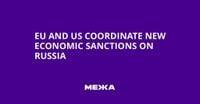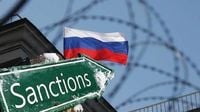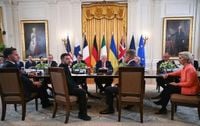On Monday, September 8, 2025, a pivotal meeting is set to take place in Washington, D.C., as senior European Union officials, headed by EU sanctions envoy David O’Sullivan, join their American counterparts at the U.S. Department of the Treasury. The focus: crafting new strategies to ramp up economic pressure on Russia, including the possibility of fresh sanctions, as reported by the Associated Press and confirmed by multiple European and American sources.
The transatlantic gathering is the latest in a series of increasingly urgent diplomatic maneuvers aimed at countering Russia’s ongoing war in Ukraine, now in its fourth year. According to an EC spokesperson, the European Commission confirmed its outreach to O’Sullivan for this high-level trip, underscoring the EU’s commitment to close coordination with the United States. The meeting will see participation from officials at the White House, State Department, and the U.S. Trade Representative’s office, ensuring a broad-based American presence in the talks.
This diplomatic push follows a flurry of communications among top leaders. On Friday, September 5, Treasury Secretary Scott Bessent spoke with European Commission President Ursula von der Leyen to lay the groundwork for Monday’s meeting. Just a day earlier, U.S. Vice President J.D. Vance had held discussions with a senior EU official, emphasizing the need for a united front. According to the Associated Press, President Donald Trump also engaged in a heated phone call with European leaders following the Coalition of the Willing meeting in Paris on September 4, after which EU representatives urged Trump to send U.S. delegates to Washington within 48 hours to establish a sanctions-focused working group.
The current wave of diplomatic activity comes amid rising frustrations in Washington. President Trump, who has repeatedly expressed his desire to end the war, has seen his August-imposed deadline for the Kremlin to withdraw from Ukraine come and go with no resolution in sight. Despite a summit last month in Alaska with Russian President Vladimir Putin, and Trump’s efforts to broker direct talks between Putin and Ukrainian President Volodymyr Zelenskyy, the conflict has only intensified. Notably, Russia recently launched a rare drone and missile attack on western Ukraine, striking an American-owned electronics plant—a move that has further strained relations and heightened the urgency for action.
In the Oval Office this week, Trump did not mince words when asked about the next steps. "Whatever Putin decides to do, we’ll either be happy about it or unhappy. And if we’re unhappy about it, you’ll see things happen," he told reporters, as relayed by the Associated Press. On Thursday, September 4, Trump publicly called on European leaders to halt their purchases of Russian oil, highlighting that Russia received €1.1 billion in fuel sales from the EU in just one year. He also underscored the necessity of pressuring China, which he accused of indirectly supporting Russia’s war efforts by facilitating economic resources.
European leaders, for their part, have not stood still. On September 5, during a visit to Uzhhorod, European Council President António Costa announced at a joint press conference with President Zelenskyy that Brussels was already drafting a new package of sanctions against Russia. Costa confirmed that the European delegation would travel to Washington to coordinate these measures with American partners, in hopes of speeding up the adoption of additional economic restrictions and presenting a consolidated stance on the international stage.
The scope of the sanctions under discussion is wide-ranging. Norway, for example, has recently lowered its price cap on Russian oil to $47.6 per barrel, aligning with EU measures and seeking to further restrict Moscow’s revenues. Switzerland has also expanded its sanctions regime, joining the EU’s 18th sanctions package, which targets so-called "shadow fleets"—vessels used to circumvent oil price caps—and imposes new restrictions on economic resources available to Russia. Meanwhile, the European Union is working on its 19th package of sanctions, with a specific focus on increasing pressure on Russia’s military-industrial complex.
According to European Commission spokeswoman Anitta Hipper, the decision to send O’Sullivan and his team to Washington was reached after a telephone conversation between von der Leyen, leaders of several EU member states, and President Trump. The goal, Hipper told Ukrinform, is to "maintain a united front on sanctions against the Russians" and ensure that both sides of the Atlantic are moving in lockstep.
But even as Western leaders seek to tighten the economic noose, Moscow has responded with defiance. On Friday, September 5, President Putin warned that any foreign troops deployed to Ukraine while Russia’s invasion is ongoing would be considered "legitimate targets" by the Kremlin. This stark message came as European leaders mulled the deployment of a potential peacekeeping force—a prospect Moscow has repeatedly dismissed as "unacceptable." The Associated Press noted that European leaders have nevertheless committed to exploring this option, signaling a willingness to push the boundaries of diplomatic and economic pressure.
The upcoming Washington meeting will cover "various forms of economic pressure to exert on Russia, including new sanctions," according to Report.az. Officials will weigh different formats of restrictions, from energy sector measures to financial and trade limitations, with the aim of reducing Russia’s economic influence and stymieing its war machine. The talks are expected to produce a more coordinated and effective strategy, aligning EU and U.S. efforts and presenting a united front to the world.
As the war in Ukraine grinds on, the stakes of these negotiations could hardly be higher. The effectiveness of sanctions—both existing and forthcoming—remains a subject of debate among policymakers and analysts. While some argue that economic pressure has already weakened Russia’s capacity to sustain its military campaign, others contend that loopholes and uneven enforcement continue to undermine the impact. Still, the determination on display from both Brussels and Washington suggests that neither side is willing to let up.
In the coming days, all eyes will be on the outcome of the Washington talks. With the EU and U.S. seeking to tighten their grip on Russia’s economy, the measures agreed upon could shape the trajectory of the conflict—and the broader geopolitical landscape—for months or even years to come.
For now, the world waits to see if this renewed transatlantic cooperation can deliver the decisive pressure needed to change the course of Russia’s war in Ukraine.



